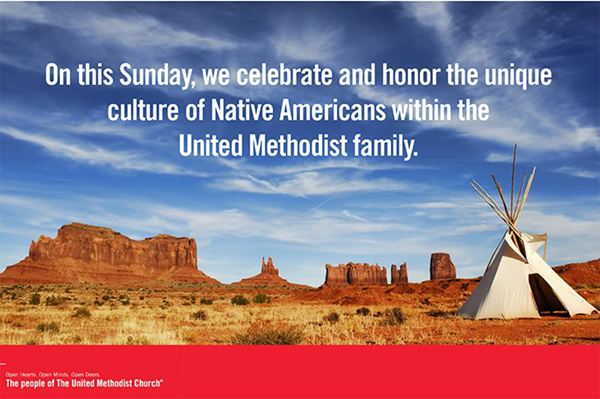A MOMENT FOR MISSION
"You have turned my mourning into dancing; you have taken off my sackcloth and clothed me with joy." —Psalm 30:11, NRSV
Dallas Indian United Methodist Church, located in Oak Cliff in the North Texas Annual Conference, is actually part of the Oklahoma Indian Missionary Conference. The church was formed in the 1950s when Native Americans relocated as part of the Indian Relocation Act. The church settled in its current location in 1967.
More than 13 different tribes are represented in the congregation, which holds two Sunday worship services along with Wednesday activities. "I love being in ministry with Dallas Indian Mission," said the Rev. J. B. Jackson. "There is a unique community of diversity here."
To help preserve their heritage, the congregation sings traditional and tribal hymns in Choctaw, Comanche and Kiowa. Community and heritage are important to the church. Meals serve both as fundraisers and community events.
Annually, the church's United Methodist Women chapter hosts an arts-and-crafts fair featuring Native American handmade crafted items, fry bread and stew. Individuals from the church educate others about their tribal heritage through demonstrations and powwows around Dallas and Fort Worth.
The church has a long tradition of helping the Native American community in North Texas, and has started dental clinics, health services centers and nutritional programs for children. Current outreach includes a deaf ministry, a community food pantry, a Bible study for seniors and a youth mentor program.
On Native American Ministries Sunday, we celebrate and support United Methodist work with our Native American sisters and brothers across the connection.
—Adapted from "Local Church Long on Tradition, Heritage and Diversity," North Texas Conference website, Nov. 14, 2018
OFFERTORY PRAYER
Loving God, clothe us with joy as we recognize and celebrate the wonderful diversity of your children. Teach us to model respect for all cultures. In your name, we pray. Amen.
From Discipleship Ministries: Third Sunday of Easter — Holy, Holy God, we bring our tithes and gifts to you this morning, confessing that often it is shallow faith that keeps us from truly embracing a generosity worthy of your blessings. Like the disciples after your Son's resurrection, we rely on our eyes to see and ignore the truths that are spoken in our hearts. Like Thomas, we want to see and touch before we can believe that you can redeem this mess-of-a-world we live in. Grant us insight that goes beyond vision, and may we offer ourselves totally to your work of redemption. In the holy name of your resurrected Son, we pray. Amen. (John 21:1-19)
NEWSLETTER NUGGET
As United Methodist congregations observe Native American Ministries Sunday, consider these suggestions from Seattle's Burke Museum of Natural History and Culture:
While Native Americans are contemporary peoples, many still practice traditions that have been passed down for generations. Discourage your congregation from making up Native American legends, ceremonies, names or dances. Instead, have them research firsthand accounts of these traditions.
Do your books present Native perspectives? Are they written by Native authors? Do you incorporate oral histories and storytelling into your lessons? Challenge the congregation to think about how history changes depending on perspective.
Dressing up or pretending to be Native American reinforces stereotypes and is detrimental to the intent of thinking critically about how a person or people in a specific situation may have felt or reacted.
We see representations of Native peoples everywhere. Many representations are stereotypical and culturally insensitive. Challenge members to view these depictions critically and consider the importance of highlighting diverse and contemporary Native American peoples in popular culture.
—Adapted from "Tips for Teaching about Native Peoples," Burke Museum of Natural History and Culture website, Nov. 1, 2018

